
John D'Angelo, MD, senior vice president, executive director of Emergency Medicine Services at Northwell Health, describes the importance for hospital staff to be prepared for outbreaks.

John D'Angelo, MD, senior vice president, executive director of Emergency Medicine Services at Northwell Health, describes the importance for hospital staff to be prepared for outbreaks.

Barry Kreiswirth, PhD, founding director, Public Health Research Institute Tuberculosis Center, professor of medicine at Rutgers University, explains which populations are most susceptible to antibiotic-resistant organisms.

John D'Angelo, MD, senior vice president, executive director of Emergency Medicine Services at Northwell Health, explains why he remains optimistic in the face of antibiotic resistance.

Barry Kreiswirth, PhD, founding director, Public Health Research Institute Tuberculosis Center, professor of medicine at Rutgers University, discusses challenges associated with the approval of novel antibiotics.

John D'Angelo, MD, senior vice president, executive director of Emergency Medicine Services at Northwell Health, describes how hospital clinicians can identify and treat patients at highest risk for contracting antibiotic-resistant infections.
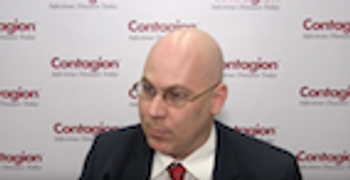
Kirk Hevener, PharmD, PhD, assistant professor of Biomedical and Pharmaceutical Sciences at Idaho State University, College of Pharmacy, discusses the advantages of narrow spectrum antibiotics.
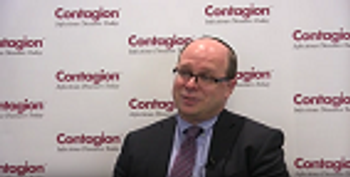
David Rosenthal, DO, PhD, medical director for the Center for Young Adult, Adolescent and Pediatric HIV Care at Northwell Health, discusses how close researchers are to finding a cure for HIV.

Kirk Hevener, PharmD, PhD, assistant professor of Biomedical and Pharmaceutical Sciences at Idaho State University, College of Pharmacy, explains how clinicians can identify pathogenic organisms to determine which narrow spectrum antibiotic to use for treatment.

Justin R. Anderson, PhD, associate professor of biology at Radford University, explains the factors that make some people more susceptible to contracting mosquito-borne viruses.

John D'Angelo, MD, senior vice president and Executive Director of Emergency Medicine Service at Northwell Health, discusses what he believes to be the most common infectious disease
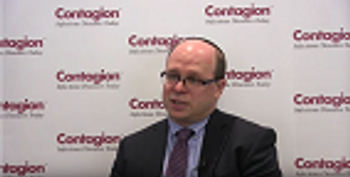
David Rosenthal, DO, PhD, medical director for the Center for Young Adult, Adolescent and Pediatric HIV Care at Northwall Health, explains why condom use is still recommended for HIV patients on antiretroviral therapy.

Justin R. Anderson, PhD, associate professor of biology at Radford University, discusses what factors will aid mosquito control specialists in eradicating vector populations.
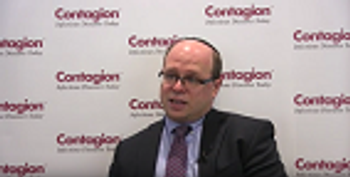
David Rosenthal, DO, PhD, medical director at the Center for Young Adult, Adolescent and Pediatric HIV Care at Northwell Health, reflects on a JAMA study, which states that use of antiretroviral therapy reduced the risk of HIV transmission during condomless sex.

Justin R. Anderson, PhD, associate professor of biology at Radford University, discusses how endocrine disrupting chemicals (EDCs) affect the amount of a virus in infected mosquitoes.

Justin R. Anderson, PhD, associate professor of biology at Radford University, discusses how endocrine disrupting chemicals interact with larvae to change infected mosquitoes.
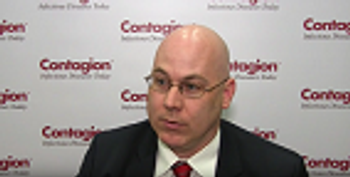
Kirk Hevener, PharmD, PhD, assistant professor of Biomedical and Pharmaceutical Sciences at Idaho State University, College of Pharmacy, explains the difference between topoisomerase I and quinolone antibacterials.

Craig Rubens, MD, PhD, co-founder and executive director of GAPPS at Seattle Children’s Hospital, discusses exciting advancements being made in improving the treatment of pregnant women and babies.

Craig Rubens, MD, PhD, co-founder and executive director of GAPPS at Seattle Children’s Hospital, discusses the goals of the Global Alliance to Prevent Prematurity and Stillbirth (GAPPS).

Micaela Martinez, PhD, postdoctoral fellow in the Department of Ecology and Evolutionary Biology at Princeton University, explains the potential benefit to administering the polio vaccines seasonally.

Craig Rubens, MD, PhD, co-founder and executive director of GAPPS at Seattle Children’s Hospital, discusses the need for more research on neonatal infections.

Micaela Martinez, PhD, postdoctoral fellow in the Department of Ecology and Evolutionary Biology at Princeton University, explains how understanding the reproductive ratio of polio can help timing vaccine campaigns.

Craig Rubens, MD, PhD, co-founder and executive director of GAPPS at Seattle Children’s Hospital, discusses the importance of understanding the global burden of neonatal death and disease.

Micaela Martinez, PhD, postdoctoral fellow in the Department of Ecology and Evolutionary Biology at Princeton University, explains how studying polio in the absence of intervention can provide insight into how to eradicate the disease.

Romney Humphries, PhD, D(ABMM), section chief of Clinical Microbiology at the University of California, Los Angeles, discusses how stewardship recommendations can drive change in how physicians manage their patients.

Micaela Martinez, PhD, postdoctoral fellow in the Department of Ecology and Evolutionary Biology at Princeton University, discusses how vector seasonality can potentially be used to eradicate polio worldwide.

Romney Humphries, PhD, D(ABMM), section chief of Clinical Microbiology at the University of California, Los Angeles, discusses the importance of minimizing the gap between clinical trial data and real world outcomes.

Micaela Martinez, PhD, postdoctoral fellow in the Department of Ecology and Evolutionary Biology at Princeton University, discusses how the poliovirus has not yet been eradicated despite preventive measures and deadlines.

Romney Humphries, PhD, D(ABMM), section chief of Clinical Microbiology at the University of California, Los Angeles, discusses the challenges of conducting clinical outcome studies to provide data to support new tests.

Otto Schwake, PhD, Department of Civil and Environmental Engineering at Virginia Tech, lead researcher from the Flint Water Study team, explains how metals affect the growth of Legionella.

Romney Humphries, PhD, D(ABMM), section chief of Clinical Microbiology at the University of California, Los Angeles, discusses the two approaches used to detect antimicrobial susceptibility: genotypic and phenotypic.